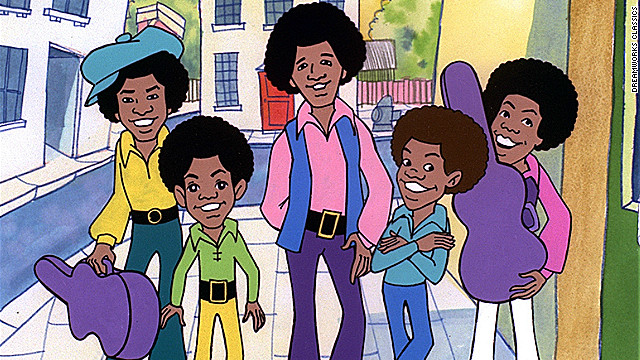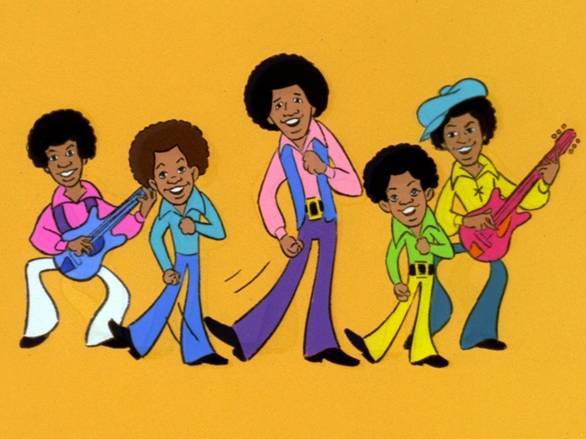The Misunderstood Power of Michael Jackson's Music
JOSEPH VOGELFEB 8 2012, 11:14 AM ET
His influence today proves him to be one of the greatest creators of all time, but Jackson's art--like that of many black artists--still doesn't get the full respect it deserves.

AP Images
More than two and a half years after his untimely death, Michael Jackson continues to entertain. Cirque du Soleil's crowd-pleasing Michael Jackson Immortal World Tour is currently crisscrossing North America, while a recent Jackson-themed episode of Glee earned the show a 16 percent jump in ratings and its highest music sales of the season. Even Madonna's halftime Super Bowl spectacle harkened back to a trend first initiated by Jackson.
But there is another crucial part of Jackson's legacy that deserves attention: his pioneering role as an African-American artist working in an industry still plagued by segregation, stereotypical representations, or little representation at all.
Jackson never made any qualms about his aspirations. He wanted to be the best. When his highly successful Off the Wall album (in 1981, the best-selling albumever by a black artist) was slighted at the Grammy Awards, it only fueled Jackson's resolve to create something better. His next album, Thriller, became the best-selling album by any artist of any race in the history of the music industry. It also won a record-setting seven Grammy awards, broke down color barriers on radio and TV, and redefined the possibilities of popular music on a global scale.
Yet among critics (predominantly white), skepticism and suspicion only grew. "He will not swiftly be forgiven for having turned so many tables," predicted James Baldwin in 1985, "for he damn sure grabbed the brass ring, and the man who broke the bank at Monte Carlo has nothing on Michael."
Baldwin proved prophetic. In addition to a flood of ridicule regarding his intelligence, race, sexuality, appearance, and behavior, even his success and ambition were used by critics as evidence that he lacked artistic seriousness. Reviews frequently described his work as "calculating," "slick," and "shallow." Establishment rock critics such as Dave Marsh and Greil Marcus notoriously dismissed Jackson as the first major popular music phenomenon whose impact was more commercial than cultural. Elvis Presley, the Beatles, and Bruce Springsteen, they claimed, challenged and re-shaped society. Jackson simply sold records and entertained.
The point of his ambition wasn't money and fame; it was respect.
It shouldn't be much of a strain to hear the racial undertones in such an assertion. Historically, this dismissal of black artists (and black styles) as somehow lacking substance, depth and import is as old as America. It was the lie that constituted minstrelsy. It was a common criticism of spirituals (in relation to traditional hymns), of jazz in the '20s and '30s, of R&B in the '50s and '60s, of funk and disco in the '70s, and of hip-hop in the '80s and '90s (and still today). The cultural gatekeepers not only failed to initially recognize the legitimacy of these new musical styles and forms, they also tended to overlook or reduce the achievements of the African-American men and women who pioneered them. The King of Jazz, for white critics, wasn't Louis Armstrong, it was Paul Whiteman; the King of Swing wasn't Duke Ellington, it was Benny Goodman; the King of Rock wasn't Chuck Berry or Little Richard, it was Elvis Presley.
Given this history of white coronation, it is worth considering why the media took such issue with referring to Michael Jackson as the King of Pop. Certainly his achievements merited such a title. Yet up until his death in 2009, manyjournalists insisted on referring to him as the "self-proclaimed King of Pop." Indeed, in 2003, Rolling Stone went so far as to ridiculously re-assign the title to Justin Timberlake. (To keep with the historical pattern, just last year the magazine devised a formula that coronated Eminem--over Run DMC, Public Enemy, Tupac, Jay-Z, or Kanye West--as the King of Hip Hop).
Jackson was well-aware of this history and consistently pushed against it. In 1979, Rolling Stone passed on a cover story about the singer, saying that it didn't feel Jackson merited front cover status. "I've been told over and over again that black people on the covers of magazines don't sell copies," an exasperated Jackson told confidantes. "Just wait. Some day those magazines will comebegging for an interview."
Jackson, of course, was right (Rolling Stone editor Jann Wenner actually sent a self-deprecatory letter acknowledging the oversight in 1984). And during the 1980s, at least, Jackson's image seemed ubiquitous. Yet over the long haul, Jackson's initial concern seems legitimate. As shown in the breakdown below, hisappearances on the front cover of Rolling Stone, the United States' most visible music publication, are far fewer than those of white artists:
- John Lennon: 30
- Mick Jagger: 29
- Paul McCartney: 26
- Bob Dylan: 22
- Bono: 22
- Bruce Springsteen: 22
- Madonna: 20
- Britney Spears: 13
- Michael Jackson: 8 (two came after he died; one featured Paul McCartney as well)
Is it really possible that Michael Jackson, arguably the most influe...th century, merited less than half the coverage of Bono, Bruce Springsteen, and Madonna?
Of course, this disregard wasn't limited to magazine covers. It extended into all realms of print media. In a 2002 speech in Harlem, Jackson not only protested his own slights, but also articulated how he fit into a lineage of African-American artists struggling for respect:
All the forms of popular music from jazz to hip-hop, to bebop, to soul [come from black innovation]. You talk about different dances from the catwalk, to the jitterbug, to the charleston, to break dancing -- all these are forms of black dancing...What would [life] be without a song, without a dance, and joy and laughter, and music. These things are very important but if you go to the bookstore down the corner, you will not see one black person on the cover. You'll see Elvis Presley, you'll see the Rolling Stones...But we're the real pioneers who started these [forms]."
While there was certainly some rhetorical flourish to his "not one black person on the cover" claim, his broader point of severely disproportionate representation in print was unquestionably accurate. Books on Elvis Presley alone outnumber titles on Chuck Berry, Aretha Franklin, James Brown, Ray Charles, Marvin Gaye, Stevie Wonder, and Michael Jackson combined.
When I began my book, Man in the Music: The Creative Life and Work of Michael Jackson, in 2005, there wasn't one serious book focused on Jackson's creative output. Indeed, at my local Barnes & Noble, I could find only two books about him, period. Both dealt with the scandals and controversies of his personal life.
It seemed the only way Michael Jackson could get covered was if he was presented as a freak, a curiosity, a spectacle. Even reviews of his albums, post-Thriller, focused on the sensational and were overwhelmingly condescending, when not outright hostile.
Of course, this poor coverage wasn't only about race. Biases were often more subtle, veiled and coded. They were wrapped together with his overall otherness and conflated with the "Wacko Jacko" media construct. In addition, as Baldwin astutely noted, there were not entirely unrelated apprehensions about his wealth and fame, anxieties about his eccentricities and sexuality, confusion about his changing appearance, contempt for his childlike behavior, and fears about his power.
But the bottom line is this: Somehow, in the midst of the circus that surrounded him, Jackson managed to leave behind one of the most impressive catalogs in the history of music. Rarely has an artist been so adept at communicating the vitality and vulnerability of the human condition: the exhilaration, yearning, despair, and transcendence. Indeed, in Jackson's case he literally embodied the music. It charged through him like an electric current. He mediated it through every means at his disposal--his voice, his body, his dances, films, words, technology and performances. His work was multi-media in a way never before experienced.
This is why the tendency of many critics to judge his work against circumscribed, often white, Euro-American musical standards is such a mistake. Jackson never fit neatly into categories and defied many of the expectations of rock/alternative enthusiasts. He was rooted deeply in the African-American tradition, which is crucial to understanding his work. But the hallmark of his art is fusion, the ability to stitch together disparate styles, genres and mediums to create something entirely new.
If critics simply hold Jackson's lyrics on a sheet of paper next to those of Bob Dylan, then, they will likely find Jackson on the short end. It's not that Jackson's lyrics aren't substantive (on the HIStory album alone, he tackles racism, materialism, fame, corruption, media distortion, ecological destruction, abuse, and alienation). But his greatness is in his ability to augment his words vocally, visually, physically, and sonically, so that the whole is greater than the sum of its parts.
Listen, for example, to his non-verbal vocalizations--the cries, exclamations, grunts, gasps, and improvisatory vernacular--in which Jackson communicates beyond the strictures of language. Listen to his beat boxing and scatting; how he stretches or accents words; his James Brown-like staccato facility; the way his voice moves from gravelly to smooth to sublime; the passionate calls and responses; the way he soars just as naturally with gospel choirs and electric guitars.
Listen to his virtuosic rhythms and rich harmonies; the nuanced syncopation and signature bass lines; the layers of detail and archive of unusual sounds. Go beyond the usual classics, and play songs like "Stranger in Moscow," "I Can't Help It ," "Liberian Girl ," "Who Is It," and "In the Back." Note the range of subject matter, the spectrum of moods and textures, the astounding variety (and synthesis) of styles. On the Dangerous album alone, Jackson moves from New Jack Swing to classical, hip hop to gospel, R&B to industrial, funk to rock. It was music without borders or barriers, and it resonated across the globe.
However, it wasn't until Jackson's death in 2009 that he finally began to engender more respect and appreciation from the intelligentsia. It is one of humanity's strange habits to only truly appreciate genius once it's gone. Still, in spite of the renewed interest, the easy dismissals and disparity in serious print coverage remains.
As a competitor on par with the legendary Muhammad Ali, Michael Jackson wouldn't be satisfied. His goal was to prove that a black artist could do everything a white artist could (and more). He wanted to move beyond every boundary, earn every recognition, break every record, and achieve artistic immortality ("That is why to escape death," he said, "I bind my soul to my work"). The point of his ambition wasn't money and fame; it was respect.
As he boldly proclaimed in his 1991 hit, "Black or White," "I had to tell them I ain't second to none."
http://www.theatlantic.com/entertainment/archive/2012/02/the-misunderstood-power-of-michael-jacksons-music/252751/2/
 New topic
New topic Printable
Printable







 Report post to moderator
Report post to moderator